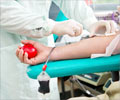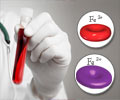- Blood typing - (https://medlineplus.gov/ency/article/003345.htm)
- Blood Group - (https://en.wikipedia.org/wiki/blood_type)
- Blood Types - (http://www.redcrossblood.org/learn-about-blood/blood-types)
What is a Blood Group?
Red blood cells (RBCs) or erythrocytes are present in the blood and contain certain proteins on their surface. These proteins are called antigens. There are various types of red blood cell antigens - the ABO and rhesus types are clinically the most important among them.
ABO Blood Grouping System - Important Facts
- The ABO blood group system was discovered by Karl Landsteiner in 1901.
- He established that a person’s blood group is determined by specific antigens or protein substances found on the surface of the red blood cells.
- All individuals have the H antigen on their red blood cells. Persons having only the H antigen are known to have the basic blood group O. The H antigen is the precursor for the A and B antigens. Together the 3 antigens form the basis of the ABO blood grouping system.
- In total there are 4 different blood groups. They are A, B, AB and O blood groups. Blood group O is the most commonly occurring and Blood group AB is the least common.
- Antibodies against whichever antigen is not occurring on the person’s RBCs naturally occur in the plasma. This is referred to as The Law of Landsteiner. It is explained below.
- A person having the blood group A will have the A antigen on the surface of red blood cells and antibodies to the B antigen that he does not possess.
- A person having the blood group B will have the B antigen on the surface of red blood cells and anti-A antibodies in your plasma.
- Those having the blood group AB will have A and B antigens on the surface of red blood cells and no antibodies to A or B antigens in plasma.
- Blood group AB individuals are considered universal recipients since they do not have any antibodies that will attack the donor’s antigens.
- Those having the blood group O will lack both type A and type B antigens on the surface of red blood cells but will have anti-A and anti-B antibodies in plasma.
- Blood group O individuals are considered universal donors since they do not have antigens that can be attacked by antibodies present in other blood types.
Table Illustrating Antigen and Antibody Occurring In a Person According To Their Blood Group
| Blood Group | Antigen | Antibody |
| A | A | Anti-B |
| B | B | Anti-A |
| AB | A & B | None |
| O | None | Anti-A and Anti-B |
Rhesus Blood Grouping System
- The Rh or Rhesus system is the second most common blood grouping system. It was first detected in 1940 by Landsteiner and Wiener. Rh typing is the test done to determine whether a person is Rh positive or negative.
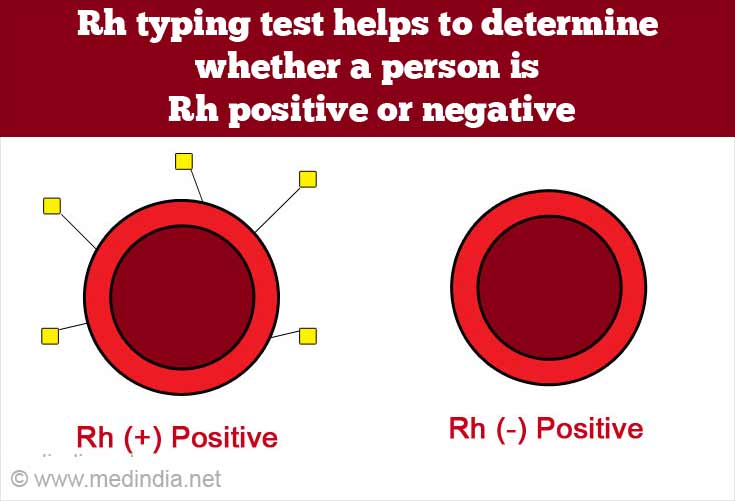
- Most people are "rhesus positive" as they have rhesus antigens on their red blood cells. The most significant Rh antigen is the D antigen, also known as the Rh factor.
- If the D antigen is present, that person is Rh-positive (denoted by a “+” sign next to their ABO blood group); if the D antigen is absent, that person is Rh-negative (denoted by a “-” sign next to their ABO blood group).
- The small percentage of people who lack the D antigen do not make the anti-D antibodies naturally. This is in contrast to the ABO antigens where the antibody to the lacking antigen occurs naturally in the plasma.
Antigen and Antibody Occurring In Each Blood Group And Rh Type
| Blood Group | Antigen | Antibody |
| A+ | A, D | Anti-B |
| A- | A | Anti-B |
| B+ | B, D | Anti-A |
| B- | B | Anti-A |
| AB+ | A, B & D | None |
| AB- | A & B | None |
| O+ | D | Anti-A and Anti-B |
| O- | None | Anti-A and Anti-B |
Frequency of Occurrence of the Various Blood Groups
Blood group O occurs in 46% of the individuals, blood group A in 42%, blood group B in 9% and blood group AB in 3% of the population.
How do we Inherit the Blood Group?
- Blood group is determined by the genes inherited from the mother and father.
- At the gene level, the ABO blood group antigens are expressed as three alternative or allelic forms (A, B and O) on chromosome 9.
- Each individual inherits one allele from each parent. A and B alleles are dominant i.e presence of one A or B allele is sufficient for being either A or B group, while the O allele is recessive i.e. both alleles have to be O for the person to be O group.
The combination of the alleles (1 from each parent) gives rise to six possible genotypes at the gene level and four possible blood groups that are clinically expressed (phenotypes).
| ABO blood group in the child | ABO alleles from mother | |||
| A (AA) | B | O | ||
| ABO alleles from father | A | A | AB | A (AO) |
| B | AB | B (BB) | B (BO) | |
| O | A (AO) | B (BO) | O (OO) | |
The genotype is indicated within the brackets
These 6 genotypes produce 4 blood groups eventually - A, B, AB and O.
What is Blood Group Testing?
Blood group testing is a laboratory test done to determine a person's blood group (A,B,AB or O) and Rh type.
ABO typing is the first test done on blood when it is tested for transfusion. A person must receive ABO-matched and Rh compatible blood during transfusion.
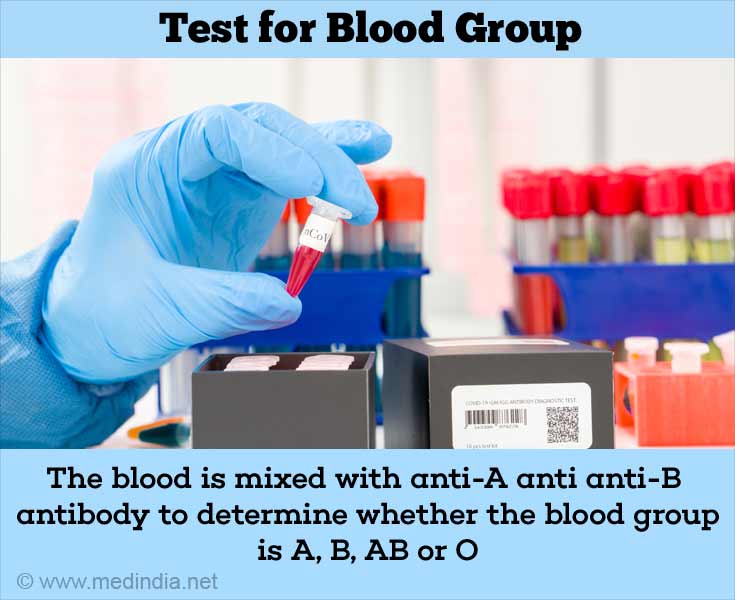
Blood Group Testing:
There are 2 steps done in blood group testing to accurately determine your blood type.
- The first step called ABO typing is done by mixing a sample of the person’s blood with both commercially available anti-A and anti-B antibody containing preparation separately on a white tile. The results are as follows:
- If a person is A group, the A antigen will react with anti-A antibody preparation and produce a visible clumping reaction.
- Similarly for B antigen. (It will react with anti-B preparation to produce clumping)
- AB group individuals will produce clumping with both preparations.
- O group persons show no clumping with either.
- The second test called back typing is done by mixing only the liquid part of your blood (without cells) known as the plasma with blood known to be type A and type B.
- Similar tests can be done to determine the rhesus type using commercially available anti-D preparation too.
A false positive result means the reaction should have been negative but agglutination occurs. This is due to late evaluation or contamination.
A false negative result means the reaction should have been positive but no agglutination occurs. This is due to early evaluation, inadequate antigen-antibody ratio and expired reagents and test cells.
There are very few risks involved in getting your blood tested. You could feel lightheaded or bleed slightly. There could be a patch of blood buildup underneath the skin or infection at the site of the needle prick.
Nowadays blood group testing is done routinely on all individuals at the time of birth or before joining school, college or work. Blood group testing is also done on pregnant women.
Blood Group Crossmatching
- Crossmatching is a test done after the blood typing to find out if a person's body will accept the blood from a donor. This is done prior to giving a blood transfusion.
- Cross matching is done by mixing a small sample of recipient blood with a small sample of the donor blood.
- The mixed blood is Scrutinized under a microscope to see if there is any clumping of blood.
- If there is no clumping it indicates that it is safe to transfuse the donor blood.
- Cross matching is also essential for organ transplantation since ABO antigens are also found on most body organs.
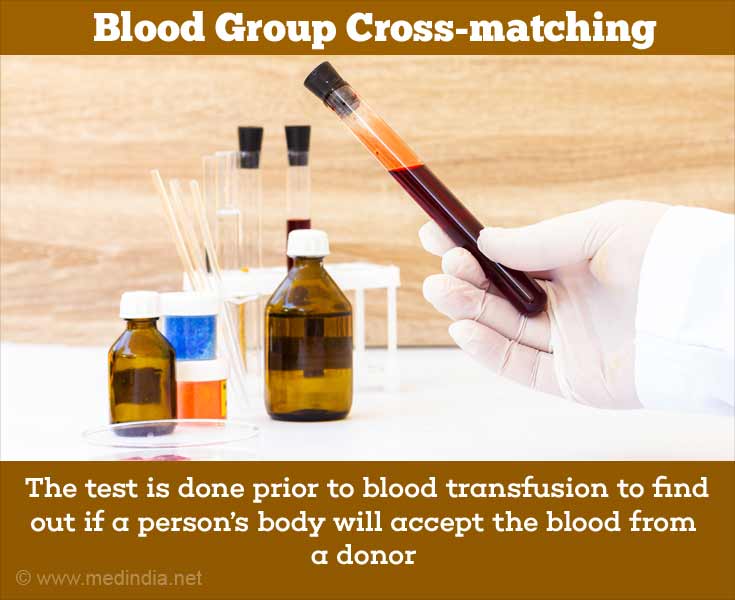
| Blood group compatibility | Donor blood group | ||||||||
| O - | O + | A - | A + | B - | B + | AB - | AB + | ||
| Receiver blood group | O - | Yes | |||||||
| O + | Yes | Yes | |||||||
| A - | Yes | Yes | |||||||
| A + | Yes | Yes | Yes | Yes | |||||
| B - | Yes | Yes | |||||||
| B + | Yes | Yes | Yes | Yes | |||||
| AB - | Yes | Yes | Yes | Yes | |||||
| AB + | Yes | Yes | Yes | Yes | Yes | Yes | Yes | Yes | |
From the figure above it is evident that O group blood can theoretically be given to all groups i.e. universal donors. AB group persons can receive blood from all groups i.e. universal recipient.
What is Blood Transfusion?
- Blood transfusion is the process of receiving blood or blood products through intravenous means for direct transfer into one’s circulation.
- Medical advancements have made it possible to transfer or replace only the lost components of the blood instead of transferring the whole blood. Red blood cells, white blood cells, plasma, clotting factors and platelets are some of the components transferred.
- Blood that is used in transfusions is usually collected by blood banks in a process involving blood donations. Any able person above the age of 17 can donate blood which is then tested for their ABO and Rh blood groups and for the presence of any infectious diseases.
- People must receive blood of the same blood type; else serious or sometimes fatal transfusion reactions can occur. The antibodies in the recipient’s blood reacts with the donor’s antigens destroying the RBCs by complement-mediated lysis. This is known as hemolysis. Other allergic reactions that are not hemolytic can also occur.











